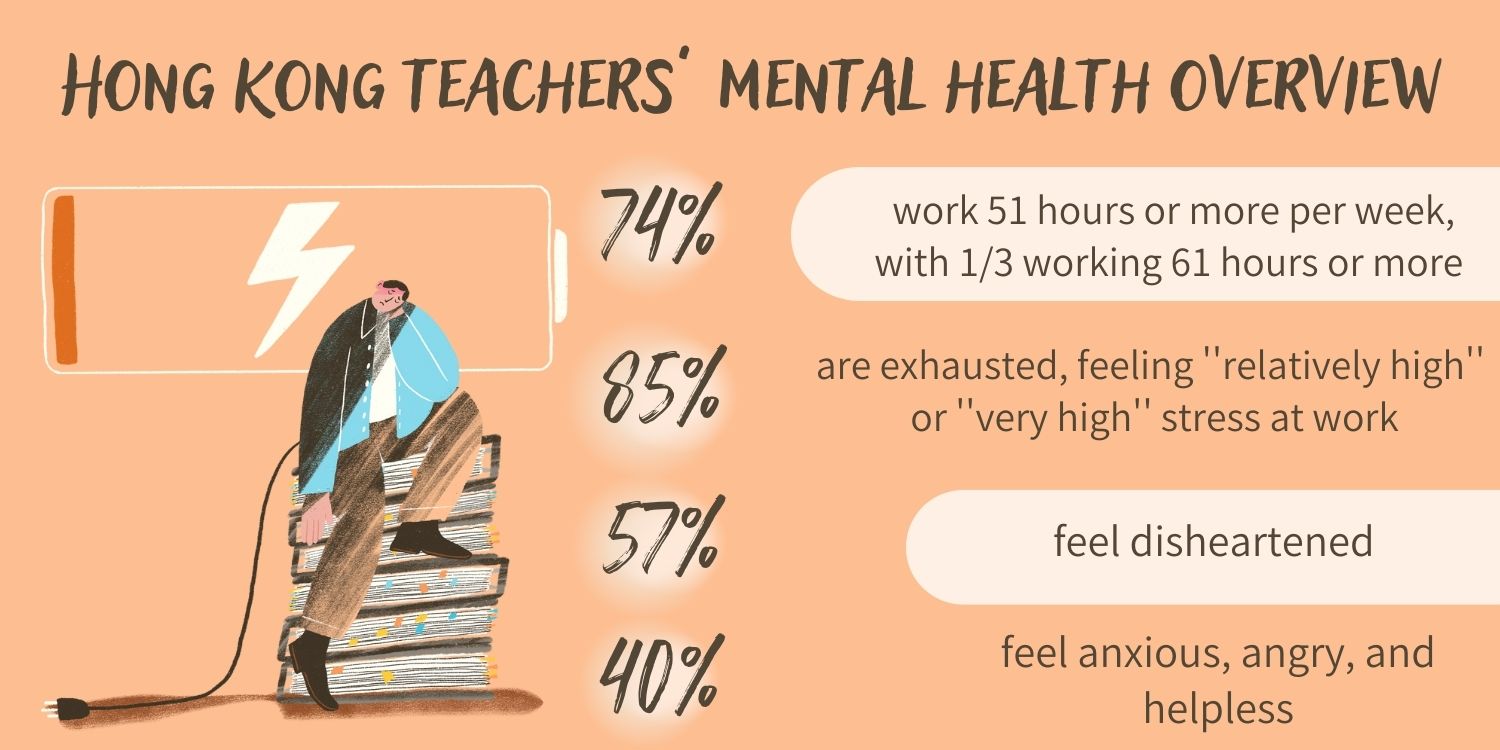We live in a world of uncertainties. With social distancing measures and hybrid mode of working as the “new normal”, our ways of living have shifted and we may feel disoriented. Children who could have their learning in classrooms have no choice but to passively accept and adapt to abrupt changes in their teaching schedule and format. Amidst all these changes, teachers are tasked to guide children onward through the mist. If learning is a voyage, teachers are asked to steady the ship during this storm, accompany and guide students through ebb and flow, act as an anchor of the soul, sure and steadfast – imparting knowledge and values to students. While we might laud our teachers for passionately impacting lives with lives, do we also know the state of their mental health?
According to a 2021 survey conducted by the Hong Kong Federation of Education Workers and the Hong Kong Education Workers Union, teachers were asked to rate their level of happiness on a scale of 1 to 10, with 10 being the highest. The average score in 2021 dropped to 5.13, from 5.16 in 2020, hitting the new low in ten years. Over 1/3 of the interviewed teachers had long working hours, with 85% feeling stressed.

Findings showed that teachers’ top four stressors are:
-57-學生之間學習差異擴大-50-學生情緒問題-1.jpg)
Age and negative emotions were inversely proportional, with younger teachers aged under 40 experiencing more negative emotions than older teachers; frontline teachers also exhibit more negative emotions than mid-level leaders. Apart from mental health well-being, teachers’ physical well-being is also alarmingly poor. Chronic pain is particularly prevalent among teachers, especially among kindergarten teachers.

From ‘‘Hong Kong teachers’ wellness (2021)’’
If teachers were farmers, responsible for sowing, watering, and nursing saplings; the schools’ organizational culture and educational policies would represent the field in which the farmers sow. The quality of the soil in the field can play a huge role in determining how efficacious the farmers’ efforts are, playing a role towards their mental health. Certainly, the farmers’ attitudes and actions are crucial elements in determining the growth of the seeds, but whether the field is arid or fertile also plays a part in how much effort the farmers have to expend.
Saddled with overwhelming responsibilities beyond teaching and communicating with students, teachers face stressors from parents, school leaders, and policymakers, eroding their sense of job satisfaction.
''The Structural Causes of Teacher Burnout in Hong Kong'' by Kwok Kuen Tsang, Associate Professor of Beijing Normal University, analyzed the sociological factors contributing to local teacher burnout:
Structural education reforms:
The Education Bureau amended the Education Ordinance, reinforcing School Based Management (SBM) in 2005, which seeks to give schools and teachers greater management authority and financial flexibility for their own development according to the needs and characteristics of students. Policymakers perceive it as a "bottom-up initiative" that ''encourages decision-making by people who work directly with and are most familiar with the needs of the students.'' Teachers are more accountable to the government and the public for the students’ performance – extensive measures to inspect and monitor have been implemented, including performance indicators, school self-evaluations, external school reviews, quality assurance inspections, etc., which in turn exacerbates teachers' burnout.
School administrative structure:
Under SBM, schools are held more accountable to the government and the public for their performance, especially in their use of the grants and funding. Thus, teachers need to spend a substantial amount of time on non-instructional work, for instance, writing appraisals and performance reports. Power and authority have become centralized at the top of school hierarchy, depriving the autonomy of teachers in decision making, work scheduling, and even their task execution. The work content and quantity are indirectly controlled by the government and the school leaders.
The Occupational and Career Structure of Teaching:
More experienced teachers tend to hold the title of Senior Graduate Master/Mistress (SGM), while less experienced teachers tend to hold a title of Graduate Master/Mistress (GM) or Certificated Master/Mistress (CM). SGM teachers are usually assigned middle or senior managerial roles in schools, such as the head or chairperson of an academic or administrative department. So, more experienced teachers generally have more decision-making power and influence over the labor process in teaching than less experienced teachers.
Teacher Disempowerment and Burnout
In sociology, when the workers’ ability/ power to decide, design, and define what, when, why, and how they perform their work is deprived, it can cause disempowerment. Hong Kong teachers have been technically and ideologically disempowered by various social structures, including structural education reforms, school administrative structure, and the occupational and career structure of teaching. Teachers may find it difficult to identify the instructional value of their work, which can lead to work alienation, and feeling of powerlessness, meaninglessness, isolation, self-estrangement, and burnout.
Findings over ten years ago already pointed out that the proportion of Hong Kong teachers experiencing mental illness was two to three times higher than the general public. In this day and age, the mental health burden for teachers is even heavier. Beyond personal factors, there is a deeper issue related to the structure and culture of the entire education system. While teachers are searching for meaning and satisfaction in their enlightening journey, who should be helping them to position and navigate their paths?
References:
Kwok Kuen Tsang (2018). The Structural Causes of Teacher Burnout in Hong Kong, Chinese Education & Society, 51:6, 449-461. https://www.tandfonline.com/doi/full/10.1080/10611932.2018.1570797
Cheung, A. C. K., Chao, G. C. N., Lau, E., Leung, A. N. M., & Chui, H. (2021). Cultivating the psychological well-being of early-childhood education teachers: The importance of quality work life. Applied Research in Quality of Life. Advance online publication. https://doi.org/10.1007/s11482-021-09959-x
Online resources:
Hong Kong teachers’ wellness (2021). https://www.hkfew.org.hk/UPFILE/ArticleFile/202112921245829.pdf

